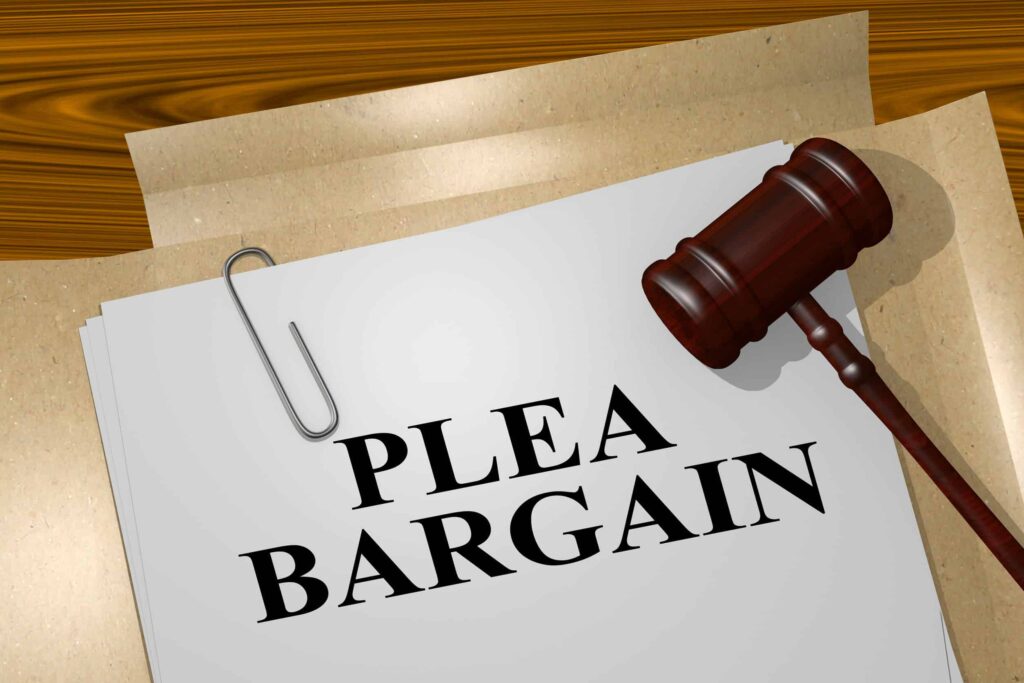How Social Media Evidence Can Hurt Your Denver Criminal Defense Case
September 26, 2025

Holiday Theft: What Colorado Law Enforcement Is Watching For
“Loophole” Has DA Arguing to Change Colorado Sexual Assault Laws
Posted by: Jacob E. Martinez
Category: Drug Crimes
When someone is charged with a criminal offense on TV, the defendant usually goes to trial in a dramatic courtroom battle. However, while some cases do go to trial in the real-life criminal justice system, most defendants don’t ever end up in the midst of a courtroom battle.
This is because the vast majority of cases – over 90% – end in plea bargains. That means that fewer than 1 in 10 people facing either state or federal charges go to trial.
So, what exactly is a plea bargain? This is something that occurs when the defendant pleads guilty to a crime in exchange for a lesser charge, reduced sentence, or some other form of leniency.
Plea bargains benefit the criminal justice system by reducing prosecutors’ caseloads and freeing up courtroom dockets. They also guarantee prosecutors a guilty verdict.
It begs an important question, though: are plea bargains in the best interest of the defendant?
The short answer is that it depends. Although a plea bargain should always be considered, factors such as the severity of your charges, the prosecution’s case against you, and what deal the prosecution has offered will all weigh in.
So let’s take a look at how plea bargains work, and whether it’s in your best interests to take one if you’re facing Colorado drug crime charges.
A plea bargain is an agreement between the prosecution and defense in which the defendant pleads guilty or no contest to criminal charges in exchange for the prosecution reducing the number or severity of charges, or somehow decreasing the defendant’s sentence.
Plea bargaining has practical benefits for both the prosecution and the defense:
In most cases, plea bargains are offered to the defense before the case goes to trial. The defendant is offered reduced charges or sentencing in exchange for a guilty plea.
If the plea bargain is accepted, the defendant waives his or her right to a trial by jury, and is forced to admit guilt in exchange for a lesser sentence. Likewise, the prosecution waives their right to prosecute the defendant to the “fullest extent of the law,” but is guaranteed a guilty conviction.
In the eyes of the prosecution, a conviction is often the most important priority. Prosecutors are therefore likely to suggest a plea bargain, and in some cases may even pressure defendants to take a plea deal.
If you are facing drug charges, a plea deal could greatly reduce the criminal penalties you face. For example, if you’re facing a drug trafficking charge for allegedly trafficking 15 grams of cocaine, you could face a felony conviction punishable by up to 16 years in prison and $750,000 in fines.
Depending on your prior criminal record and the circumstances of the alleged offense, the prosecution may opt to reduce the charge to drug possession, which would still be a felony, but carries a prison sentence of 2-6 years and a fine of $2,000-$500,000.
In most plea deals, you should expect for the sentence to be on the lower end of these ranges – a significant reduction from the sentence you would face for a trafficking conviction. In some cases, the prosecution may further reduce your sentence, or even offer you probation instead of jail time.
The thing to remember is that no matter how good a plea deal looks, you are still forced to plead guilty. If you are innocent of the crime you’re being accused of, this can be a hard pill for many to swallow.
You always have the right to defend yourself in court, but if you do so, you will have to fight hard for your innocence and make sure you are employing the strongest possible defense strategy.
Moreover, the reality is that prosecutors don’t like to lose. Because of this, they only tend to bring criminal charges when they believe a defendant is guilty, and that their case is strong enough to win a conviction. Prosecutors will sometimes even threaten or cajole a defendant into pleading guilty. If you refuse, this can spur prosecutors to go after the maximum penalty at trial.
It’s not an easy decision, which is just one reason why you need to immediately contact an experienced Denver criminal defense attorney as soon as you are charged with a drug crime. When you are offered a plea bargain – and it’s practically inevitable that you will be – an attorney can help you determine whether you’re being offered a good deal, and they can advocate for you in the negotiation process.
About the Author:
Denver-based criminal defense and DUI attorney Jacob E. Martinez is a knowledgeable and experienced litigator with a record of success providing innovative solutions to clients facing criminal charges of any severity. Mr. Martinez has been designated a Top 100 Trial Lawyer by the National Trial Lawyers and has been awarded both the Avvo Client’s Choice Award and Avvo Top Attorney designation, evidencing his reputation for his exemplary criminal and DUI defense work and high moral standards.
Jury Trial - Not Guilty
Jury Trial - Not Guilty
Arapahoe 1st Degree Assault/Vehicular Assault
Jury Trial - Not Guilty
Denver Domestic Violence Assault Case
Jury Trial - Not Guilty
Denver D.V. Assault
Jury Trial - Not Guilty
Denver Careless Driving Resulting in Death
Jury Trial - Not Guilty
Jefferson County Felony Menacing
Jury Trial - Not Guilty
Adams County DUI
Jury Trial - Not Guilty
Jefferson County DUI
Jury Trial - Not Guilty
Jefferson County DUI
Jury Trial - Not Guilty
Jefferson Vehicular Assault/DUI
Jury Trial - Not Guilty
Jefferson County DUI
Jury Trial - Not Guilty
Boulder County DUI case
Jury Trial - Not Guilty
Arapahoe County DUI case
Jury Trial - Not Guilty
Adams County DUI case
Jury Trial - Not Guilty
Douglas County DUI case
Jury Trial - Not Guilty
Gilpin County DUI case
Dismissed
Broomfield County Probation Revocation case
Dismissal
Arapahoe County DUI case
Deferred Judgment
Arapahoe County DUI case
Deferred Judgment
Douglas County DUI case
Deferred Judgment
Larimer County DUI case
Deferred Judgment
Arapahoe County DUI Case
Deferred Judgment
Denver Felony Burglary Case
Deferred Judgment
Arapahoe County DUI case
Dismissed
Arapahoe County Protection Order Case
Dismissed
Golden Destruction of Property case
Dismissed
Jefferson County Protection Order case
Dismissed
Jefferson County Domestic Violence case
Dismissed and Sealed
Jefferson County DUI case
Dismissed
Denver Major Traffic Offense case
Dismissed and Sealed
Broomfield County Domestic Violence case
Dismissed
Summit County DUI Revocation
Dismissed
Denver DUI Revocation
Dismissed
Denver DUI Revocation
Dismissed
Denver DUI +.2 Involving Accident and Injury case
Dismissed
Denver DUI/Habitual Traffic Offender case
DISMISSAL
Denver District Aggravated Theft
Dismissed
Greenwood Village Assault case
Dismissal
Elbert County DUI
Dismissed
Arapahoe County Domestic Violence case
Dismissal
Jefferson County DUI
Dismissal
Denver Municipal Assault
Dismissed
Boulder County Domestic Violence Assault case
Dismissed
Wheat Ridge Assault case
Dismissed
Jefferson County DUI case, with 2+ Prior Convictions
Dismissed
Arapahoe County Domestic Violence case
Dismissed
Broomfield County Domestic Violence case
Dismissed with No Charges Filed
Jefferson County Felony Theft case
Dismissed
Arapahoe County Felony Theft case
Dismissed
Boulder County Felony Theft case


